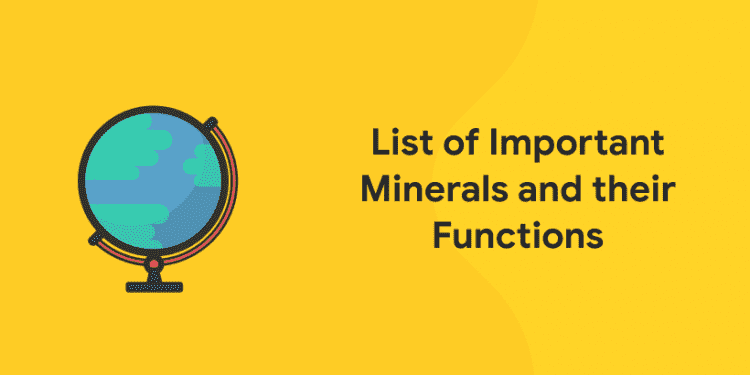Table of Contents
What is a Mineral? A mineral is a chemical compound or element which is considered essential by organisms to perform functions and be productive in their lives. It enables in constituting energy and power for daily chores and activities and supports the body of organisms to function properly. Thus, are considered as the core and important sector of diet for every organism and especially humankind. Check here to know the Important Minerals list and their Functions.
One of the four groups of relevant or prominent nutrients are vitamins, essential fatty acids, and essential amino acids. The five significant minerals in the human body are calcium, phosphorus, potassium, sodium, and magnesium. All of the left elements in a human body are called “trace elements”. The trace types of minerals elements that have a specific biochemical purpose in the human body are sulfur, iron, chlorine, cobalt, copper, zinc, manganese. Explore the important minerals list here.
Important Minerals and Functions of Minerals 2021
Sodium
Required for decent fluid balance, nerve transmission, and muscle contraction. Sees in Table salt, soy sauce; large amounts in processed foods; small amounts in milk, bread, vegetables, and unprocessed meats
Chloride
Helps in Stomach acid dilution. In Table salt, processed foods, milk, meats, and vegetables
Potassium
Helps in nerve transmission, fluid balance, and muscle contraction. Present in Meats, milk, fresh fruits and vegetables, whole grains, legumes
Calcium
Keeps Strong bones and teeth; aids muscles relax and contract; essential in nerve functioning, blood clotting
Attempt a GK Mock Test and Get Access to Mock Test Series!
Phosphorus
Important for healthy bones and teeth; found in every cell; part of the system that maintains acid-base balance. In Meat, fish, poultry, eggs, milk, processed foods (including soda pop)
Magnesium
Found in bones, protein, muscle contraction, nerve transmission, immune system health. In Nuts, seeds, legumes, leafy, green vegetables, seafood, artichokes, drinking water
Sulfur
Found in protein molecules. Occurs in foods as part of protein: meats, poultry, fish, eggs, milk, legumes, nuts
Iron
A molecule found in red blood cells that carries oxygen in the body; wanted for power metabolism. Present in Organ meats, red meats, poultry, shellfish, egg yolks; legumes; dried fruits; dark, iron-enriched bread and cereals, fortified cereals
Zinc
Part of several enzymes has a role in taste perception, wound healing, normal fetal improvement, creation of sperm, normal completion and sexual maturation, immune method strength. In Meats, fish, poultry, leavened whole grains, vegetables
Iodine
Found in thyroid hormone, which helps regulate growth, development, and metabolism. In Seafood, foods produced in iodine-rich soil, iodized salt, bread, dairy products
Selenium
It is an Antioxidant. In Meats, seafood, grains
Copper
Part of many enzymes; needed for iron metabolism. In Legumes, nuts and seeds, whole grains, organ meats, drinking water
Manganese
Part of many enzymes. Widespread in foods, especially plant foods
Fluoride
Involved in the formation of bones and teeth; helps prevent tooth decay. Gain it through Drinking water (either fluoridated or naturally containing fluoride), fish, and most teas
Chromium
Works jointly with insulin to control blood sugar levels. Present in unrefined foods, especially liver, brewer’s yeast, whole grains, nuts, cheeses
Molybdenum
Part of some enzymes. Seen in Legumes, bread and grains; leafy greens; leafy, green vegetables; milk, liver
Check here to attain more online General Knowledge Study Materials!
Biological Function and Roles of Minerals
| Dietary element | Category | High nutrient density
dietary sources |
Term for deficiency | Term for excess |
| Potassium | A systemic electrolyte and is essential in regulating ATP with sodium | Sweet potato, tomato, potato, beans, lentils, dairy products, seafood, banana, prune, carrot, orange | hypokalemia | hyperkalemia |
| Chlorine | production of hydrochloric acid in the stomach and cellular pump functions | Table salt (sodium chloride) is the main dietary source. | hypochloremia | hyperchloremia |
| Sodium | A systemic electrolyte and is essential in regulating ATP with potassium | Table salt, sea vegetables, milk, and spinach. | hyponatremia | hypernatremia |
| Calcium | heart and digestive system health builds bone, supports synthesis and function of blood cells | Dairy products, eggs, canned fish with bone, green leafy vegetables, nuts, seeds, tofu, thyme, oregano, dill, cinnamon. | hypocalcaemia | hypercalcaemia |
| Phosphorus | A component of bones cells, in energy processing, in DNA and ATP and many other functions | Red meat, dairy foods, fish, poultry, bread, rice, oats. In biological contexts, usually seen as phosphate | hypophosphatemia | hyperphosphatemia |
| Magnesium | Required for processing ATP and bones | Spinach, legumes, nuts, seeds, whole grains, peanut butter, avocado | hypomagnesemia,
magnesium deficiency |
hypermagnesemia |
| Iron | Required for many proteins and enzymes, notably haemoglobin to prevent anaemia | Meat, seafood, nuts, beans, dark chocolate | iron deficiency | iron overload disorder |
| Zinc | types of enzymes such as matrix metalloproteinases, liver alcohol dehydrogenase, carbonic anhydrase and zinc finger proteins | Oysters, nuts, whole grains, dairy products | zinc deficiency | zinc toxicity |
| Manganese | superoxide dismutase | Grains, legumes, seeds, nuts, leafy vegetables, tea, coffee | manganese deficiency | manganism |
| Copper | cytochrome c oxidase | Liver, seafood, oysters, nuts, seeds; some: whole grains, legumes | copper deficiency | copper toxicity |
| Iodine | synthesis of thyroid hormones | Seaweed, grains, eggs, iodized salt | iodine deficiency / goiter | iodism Hyperthyroidism |
| Chromium | lipid metabolism, although its mechanisms of action in the body and the amounts needed for optimal health are not well-defined | grape juice (especially red), meat, whole grain products | Chromium deficiency | Chromium toxicity |
| Molybdenum | Required for the functioning of xanthine oxidase, aldehyde oxidase, and sulfite oxidase | Legumes, whole grains, nuts | molybdenum deficiency | molybdenum toxicity |
| Selenium | Essential to the activity of antioxidant enzymes like glutathione peroxidase | Brazil nuts, seafood, organ meats, meats, grains, dairy products, eggs | selenium deficiency | selenosis |
| Cobalt | – | Required in the synthesis of vitamin | – | Cobalt poisoning |
Important Minerals and Intake Needed
1: Who was the first woman President of India?
| Sl | Minerals | Intake Needed |
| 1 | Calcium | Men need 1,000 mg per day till age 70, and 1,200 mg after that.
Women ages 51 or older need 1,200 mg of calcium per day. |
| 2 | Iron | 8 mg per day for adult men and women starting at age 50 |
| 3 | Magnesium | 420 mg per day for men 31 or older, and 320 mg per day for women 31 or older. |
| 4 | Potassium | 4,700 mg per day. |
Check here to get more General Knowledge Quizzez here!
Minerals serves its important part in the human health and human life. A balanced diet including the proper amount of minerals and nutrients is necessary. It is important to include mineral rich foods in the diet for a healthy diet plan too. The lack or defieciency of the minerals can cause many health defects and damage the proper health routine of any person. Thus, it is highly important to maintain the minerals quantity in human body.















